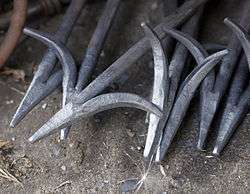Fire iron


A fire iron is any metal instrument for tending a fire. Fire irons usually come in a fireplace tool set.
Types of fire irons
There are three types of tools commonly used to tend a small fire, such as an indoor fireplace fire, or yule log: the spade, the tongs and the poker itself. These tools make it possible to handle a fire without risk of burns or blisters.
A fireplace poker, (also known as a fire iron) is a short, rigid rod, preferably of fireproof material, used to adjust coal and wood fuel burning in a fireplace, and can be used to stir up a fire. A fireplace poker is usually metallic and has a point at one end for pushing burning materials (or a hook for pulling/raking, or a combination) and a handle at the opposite end, sometimes with an insulated grip. Iron is the most popular metal from which the pokers are wrought. Brass is a more expensive alternative for a home poker set.[1]
A slice bar has a flatter tip and can be used to stir up the fire or to clear the grates of ashes. Other fires irons include the fire rake (not to be confused with the firefighter's tool), fire tongs, and fire shovel.
Many fireplace sets also include a small broom for sweeping up ash.
Japan
In Japan, traditional fire-tending device for a Japanese brazier (hibachi) is a pair of long metal chopsticks, called hibashi (火箸, fire chopsticks), used to pick up and manipulate the charcoal.
Outdoor use
Large bonfires are not amenable to the use of tools of the size commonly used in an indoor fireplace. However some individuals have been known to weld rebar into clever shapes with which to move the wood in a moderately large bonfire.
History
There is evidence that humans have used pokers since the paleolithic period. Theoretically, pokers were invented immediately after the discovery of fire. The earliest and most primitive pokers were likely made from the same material as the fuel (that is, wood in the form of a hefty branch). This ersatz wooden-type fire-tool may be called a poker or a "firestick" in colloquial terminology. The first successful mass production of stokers as a part of an entire fireplace-regalia set was designed and manufactured in Cape Girardeau, Missouri by the RL Hendrickson Manufacturing Corporation in 1898 at a cost of US$1. Today, one of the sets in fair condition can garner more than US$3500 at auction.
See also
Edward II of England#Death, popular yet largely-uncorroborated story of how a poker may have led to a monarch's death.